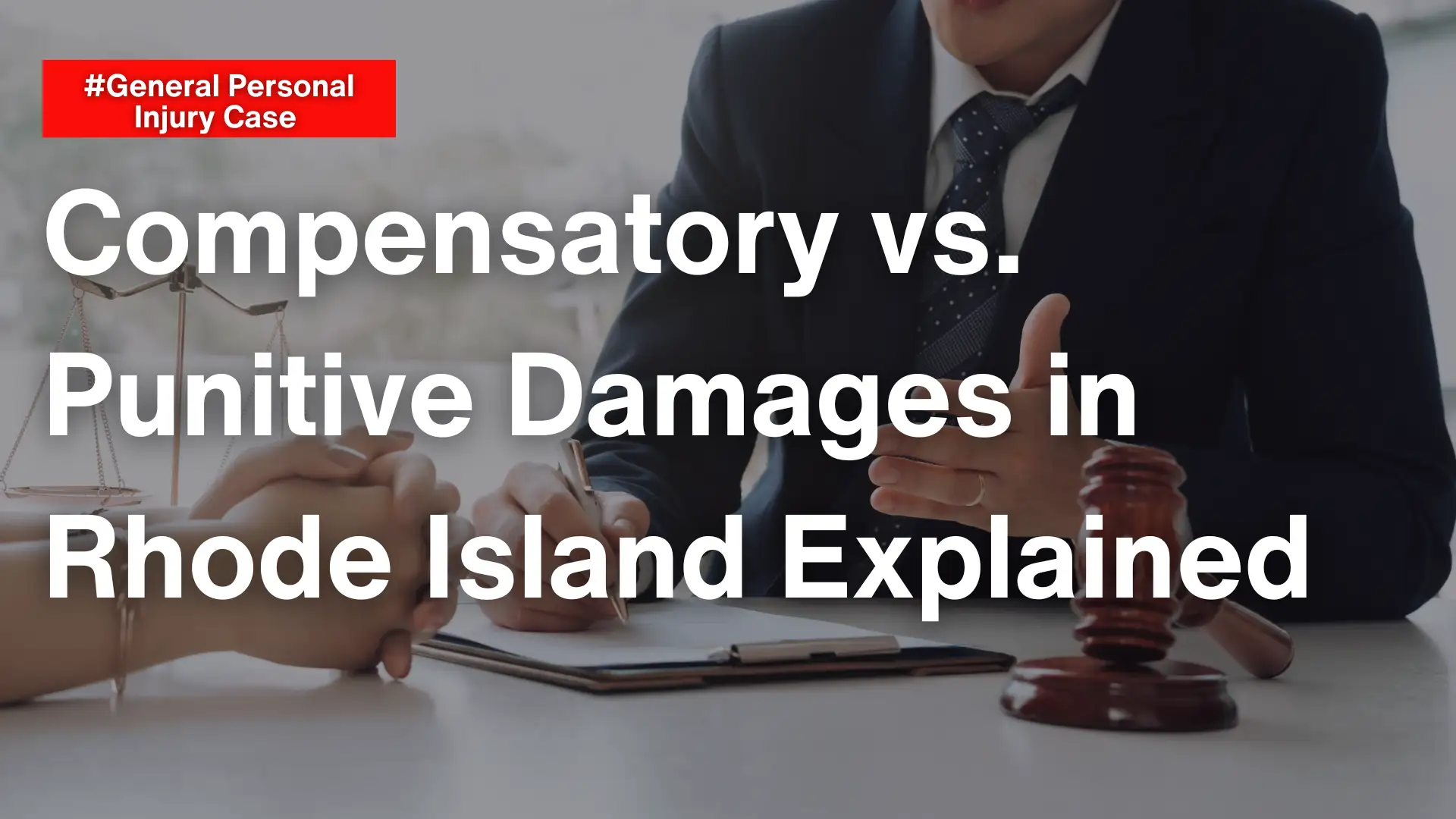 When a person gets hurt in an accident caused by someone else in Rhode Island, they have the right to pursue compensation for the harm done to them. In a personal injury case, the injured person seeks compensation from the person or entity that caused the injury. In court, that compensation is called “damages.” What’s the difference between compensatory vs punitive damages?
When a person gets hurt in an accident caused by someone else in Rhode Island, they have the right to pursue compensation for the harm done to them. In a personal injury case, the injured person seeks compensation from the person or entity that caused the injury. In court, that compensation is called “damages.” What’s the difference between compensatory vs punitive damages?
Damages serve two purposes. Compensatory damages are intended to reimburse an injured party (the plaintiff) for losses directly resulting from the at-fault party’s (the defendant’s) actions. In contrast, punitive damages serve to penalize the defendant for especially egregious behavior. Following is more information about compensatory vs. punitive damages.
Understanding Compensatory Damages
Don’t know much about compensatory damages vs punitive damages? Compensatory damages are designed to compensate plaintiffs for specific losses incurred due to the defendant’s conduct. These losses can encompass a wide range of factors, including financial, physical, and emotional damages. In Rhode Island, compensatory damages are further categorized into two primary types. What are some compensatory damages examples? The two types of damages are:
Economic Damage: These damages compensate the injured party for the objective losses that result from the accident. Medical expenses, rehabilitation costs, lost wages, property damage, and future earning capacity are all examples of the types of losses covered by economic damages.
Non-economic Damages: These damages compensate the injured person for the intangible, subjective losses that occur because of the injury. These losses are more difficult to calculate as they have no specific price. Examples include pain and suffering, emotional distress, loss of consortium, and loss of enjoyment of life.
Understanding Punitive Damages
Compensatory damages focus on providing money to make the plaintiff whole after they’ve been injured. What are punitive damages in a lawsuit? Punitive damages, on the other hand, are intended to punish the defendant for particularly reprehensible conduct and to deter others from engaging in similar behavior in the future. In Rhode Island, punitive damages are only awarded in cases where the defendant’s actions are deemed malicious or intentional or display a blatant disregard for the safety and rights of others.
Criteria for Awarding Punitive Damages
What qualifies for punitive damages? Who gets punitive damages? Primarily, the victim of the defendant’s conduct receives punitive damages. In order to secure punitive damages in Rhode Island, the plaintiff must demonstrate that the defendant’s conduct rose to a level of gross negligence or intentional misconduct. This typically involves proving that the defendant acted with malice, wantonness, or such extreme willfulness that it amounted to a deliberate indifference to the rights and safety of others.
Calculating Punitive Damages
The calculation of punitive damages differs markedly from compensatory damages. Punitive damages are determined based on the severity of the defendant’s conduct and their financial situation. In contrast, compensatory damages are quantified based on the plaintiff’s losses. The aim of punitive damages is to impose a penalty significant enough to deter both the defendant and others from engaging in similar wrongful behavior in the future.
Illustrative Examples of Punitive Damages
What examples of cases where punitive damages were awarded can you avoid? For instance, punitive damages might be warranted in a case where a corporation knowingly sells a defective product that causes severe injuries to consumers. If the corporation fails to recall or adequately warn the public about the dangers posed by the product, they are liable. If it is proven that the corporation’s actions were driven by a desire for profit at the expense of consumer safety, punitive damages may be imposed. Consequently, this is to discourage such reckless behavior. This serves as a crucial deterrent against corporate negligence and prioritizes consumer safety in the marketplace.
Key Differences Between Compensatory and Punitive Damages
What are the key differences between punitive vs compensatory damages?
- Purpose: Compensatory damages serve the primary purpose of compensating the plaintiff for the losses they suffered due to the defendant’s actions, encompassing financial, physical, and emotional harm. On the other hand, the purpose of punitive damages is to play a distinct role in addressing the defendant’s misconduct by imposing a financial penalty intended to deter similar egregious behavior in the future, thereby promoting public safety and ethical societal standards.
- Awarding Criteria: Compensatory damages are awarded based on evidence and documentation of the plaintiff’s actual losses. The focus of compensatory damages is putting the injured person in the same condition they were in prior to the injury as much as possible. Compensatory damages can be obtained in a settlement or through a court award. In contrast, punitive damages are rarely awarded, can only be awarded in court, and require clear and convincing evidence of intentional misconduct, gross negligence, or malicious behavior by the defendant.
- Calculation: The calculation of the amount of compensatory damages is methodical and involves assessing the tangible losses incurred by the plaintiff, such as medical expenses, lost wages, and property damage, in conjunction with a formula to determine the value of the plaintiff’s intangible losses to arrive at a quantifiable sum. Meanwhile, the amount of punitive damages is calculated with consideration to both the nature and egregiousness of the defendant’s actions and their financial circumstances, aiming to strike a balance between deterrence and proportionality in punishment.
Legal Considerations in Rhode Island
In Rhode Island, both compensatory and punitive damages serve critical roles in civil litigation and personal injury cases. The state allows plaintiffs to seek appropriate compensation for their losses. This also provides a means for defendants to be held accountable for their actions when their conduct warrants punitive measures. Courts in Rhode Island assess each case to determine whether punitive damages are appropriate. If they are, the courts will ensure that punitive damages are awarded judiciously. Consequently, this is in accordance with the severity of the defendant’s misconduct. This ensures that the legal process maintains integrity and reflects the community’s standards of ethical behavior and responsibility.
Get Help from the Experienced Personal Injury Lawyers from Law Offices of Ronald J. Resmini, Accident & Injury Lawyers, Ltd.
 Don’t know the difference between compensatory vs punitive damages? A nuanced understanding of punitive damages vs compensatory damages is essential for anyone pursuing a legal claim in Rhode Island. Familiarity with the kinds of damages available and when they may be applicable can influence the outcome of your case.
Don’t know the difference between compensatory vs punitive damages? A nuanced understanding of punitive damages vs compensatory damages is essential for anyone pursuing a legal claim in Rhode Island. Familiarity with the kinds of damages available and when they may be applicable can influence the outcome of your case.
It is crucial to consult experienced legal counsel. Call the seasoned Rhode Island personal injury lawyers of the Law Offices of Ronald J. Resmini, Accident & Injury Lawyers, Ltd. at (401) 751-8855 or contact us online to ensure your rights are protected and to determine the value of your case. Our firm knows how to pursue the full amount of damages you’re entitled to. In addition, we can advise you about whether punitive damages could be available in your case. Our dedicated attorneys are committed to providing comprehensive support and advocating for your best interests throughout the legal process. Call us today.
